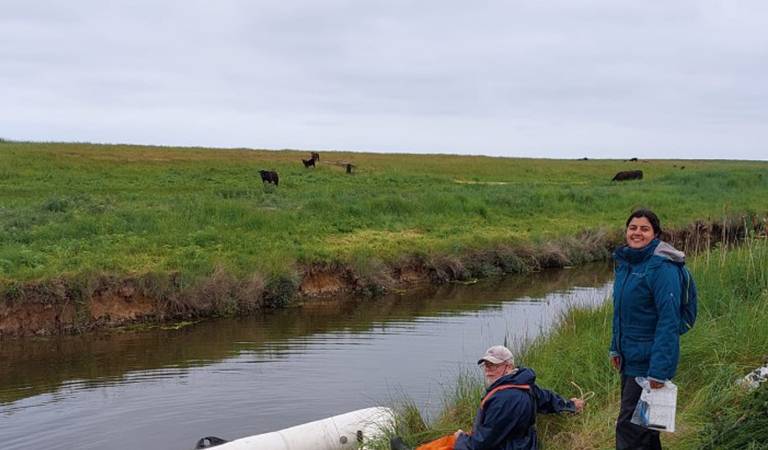Ravina Bains, MSc Aquatic Conservation, Ecology and Restoration
Meet Ravina, a graduate from our MSc Aquatic Conservation, Ecology and Restoration course and a Senior Specialist in Marine and Diadromous Fish Species (NSIPs) at Natural England.

22 February 2024
She tells us about how a desire for a career change allowed her to revisit a fascination with the aquatic.
Why were you interested in studying an MSc in Aquatic Conservation, Ecology and Restoration?
“I had always had an interest in the aquatic world, particularly the marine environment, but when choosing what career path to follow at 16 years old, I pursued my other interest in engineering.
“I later decided I wanted to undertake a career change and found this MSc which was offering a way for me to build the relevant skill set to enter this field either through industry or potentially opening up options to pursue a PhD.
“I particularly liked that it covered such a broad range of aquatic environments and really opened my eyes to how best to protect both freshwater and marine waters collaboratively.”
What was it that encouraged you to choose UCL to study it in?
“I was aware of the prestige of UCL prior to applying and was encouraged further by the number of external connections and research opportunities the Geography Department were offering.
“I really felt this was a great fit for both my circumstances, location and future career prospects.”
What were the most interesting or engaging things you learned on the course?
“I absolutely loved our field trips to Scotland and Norfolk and would encourage everyone to get stuck in with the activities as best they can to get the best experience.
“I would say the most interesting thing I learned about was the European eel and the mysterious lifecycle it leads - I found them so fascinating I even did my dissertation on them with the wonderful and ever-enthusiastic Professor Carl Sayer.
“They also really gave you an insight into the number of different habitats they need for their survival and the problems caused by damaged and blocked waterways.”
Can you tell us about any particularly memorable experiences from your time as a Masters student with us?
“The Norfolk field trip at the beginning of the course was an absolute highlight for me.
“It was my first experience of hands-on field work including handling fish, boat work and identifying saltmarsh plants.
“It was also an amazing way to get to know fellow students on the course - many of whom I am still very close friends with!
“It's safe to say I have been back to Norfolk many times since, both for field work and camping with some of my fellow course mates as a bit of a break during dissertations.
“I plan to continue going back and helping with any field work activities in the future.”
What have you done since graduating and do you hope to do in the future?
"Since graduating I have worked at the Marine Management Organisation, currently as a Fisheries Data and Services Team Officer and am hoping to move into a more scientific role focusing on fish and aquatic habitats.”
"Recently, I have become a Senior Specialist in Marine and Diadromous Fish Species (NSIPs) at Natural England."
Would you recommend studying Aquatic Conservation, Ecology and Restoration and why?
“I would definitely recommend studying Aquatic Conservation, Ecology and Restoration, especially if you want to gain more field work experience, broaden your knowledge across all water bodies - particularly freshwater, and understand the interconnectedness and ecology of some of our most precious and often overlooked ecosystems.
“I also think the course and its lecturers are incredibly motivating and can really help you understand where you see yourself within the conservation space - which is often a bit overwhelming with the number of areas to explore.
More Information
Interested in following in Ravina’s footsteps? Find out more about our MSc Aquatic Conservation, Ecology and Restoration course and see our other degrees in the Study section.
 Close
Close

